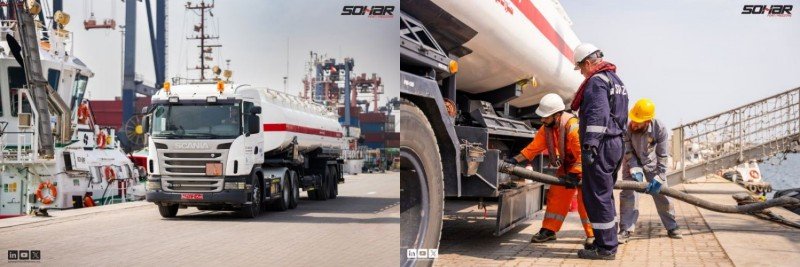SOHAR Port has made waves with its recent announcement, marking a significant milestone in Middle Eastern maritime history. The port proudly declared its pioneering utilization of biofuel bunkering in tugboat operations, a groundbreaking initiative that underscores its commitment to environmental stewardship.
The inaugural delivery of biofuel has already initiated a transformative journey, with the adoption of B20 – a blend comprising 80% diesel and 20% biofuel – commencing initially as a trial for Tug Sohar. This eco-conscious move is slated for extension to encompass all tugboats within the port’s domain, with plans underway to expand the project’s scope to include locomotives by the following month. Collaborating closely with tugboat operator Svitzer, biofuel supplier Wakud, and bunker supplier Hormuz Marine, SOHAR Port is spearheading a paradigm shift towards sustainable maritime practices.
In a concerted effort to align with global endeavors aimed at fortifying marine sustainability and mitigating carbon emissions, the Ministry of Transport, Communications, and Information Technology, in collaboration with key stakeholders across Omani ports, is diligently crafting strategic blueprints. These plans are geared towards fostering a transition towards eco-friendly mobility and attaining carbon neutrality throughout Oman by the year 2050.
Emile Hoogsteden, CEO of SOHAR Port, said “Marine operation is the main contributor to our greenhouse gas emissions, which has increased relative to the port’s growth through the direct emissions of fuel consumption in tugboat operations. Implementing biofuel in our marine operation will significantly reduce SOHAR Port’s scope of emissions and keep us firmly on the path to support Oman’s wider environmental vision on the path to net zero. With the help of our partners in this initiative, with whom we could not have achieved such a landmark moment, we have set new environmental standards for the region and beyond.”
Engineer Abdullah bin Ali Al Busaidi, an expert of the Zero Carbon Neutrality Team at the Ministry of Transport, Communications, and Information Technology, highlighted that the Ministry is collaborating with various government agencies on the 18 carbon laboratory initiatives. “The Ministry has developed a clear and comprehensive roadmap for the development of green ports, including multiple projects to reduce emissions, transitioning equipment to operate on electrical energy and smart systems, connect ships to electrical power, and establish a regional center for supplying ships with clean fuel.”
Engineer Abdullah Further added, “We are working with the concerned entities, including the Environment Agency, Ministry of Commerce, Industry, and Investment Promotion, the Ministry of Economy, and the private sector to address upcoming challenges such as pricing differences between biofuel and conventional fuel.” Al Busaidi elaborated that the private sector has also identified key raw materials for the biofuel industry, focusing on waste cooking oils used in restaurants and shops. Additionally, Sultan Qaboos University in collaboration with the Petroleum Development Oman Company (PDO) has made great strides where they have operated a Mwasalat bus powered by date palm biodiesel.
Deniz Kirdar True, Managing Director Svitzer AMEA, said “We are proud that Svitzer is collaborating with Sohar port on this important initiative. Svitzer has been providing safe and reliable marine services to customers in SOHAR Port for many years, and in SOHAR Port, we have found a partner who shares our ambitious decarbonization goals and is willing to do things differently. This innovative project is an excellent example of how we can use our experience and learnings from operations in other parts of the world to support customers and other stakeholders locally in their efforts to reduce environmental impact.”
Sulaiman Alhadhrami, CEO of Hormuz Marine, said “Working with SOHAR Port for the first biofuel bunker supply in Oman is a significant move toward emissions reduction and sustainability in the maritime industry. While marine gas oil remains necessary in the short term, gradually increasing biofuel usage will lead to substantial greenhouse gas emissions savings. This transition aligns with global efforts to combat climate change and demonstrates a commitment to a cleaner, more sustainable future in shipping.”
Biofuel bunkering will contribute to decreasing the company’s greenhouse gas emissions towards an initial target of 17%, in line with Oman’s commitment to reach net zero by 2050. Biofuel is a renewable energy derived from organic materials, primarily plant and animal matter. In this project, biofuel is sourced from used cooking oil. An eco-friendly alternative to traditional fossil fuels, it reduces greenhouse gas emissions when burned.
The project is part of SOHAR Port and Freezone’s mission to accelerate the transition to the circular economy, thereby bolstering economic development in Oman. This includes the conservation of natural resources as a cornerstone to sustainable development, with a fundamental goal to use existing resources as much as feasible, aligning with Oman Vision 2040’s goal to achieve sustainable development and foster economic competitiveness.”

About SOHAR Port and Freezone
As one of the fastest-growing ports in the world, SOHAR Port and Freezone continue to leverage their strategic location and enhance their services, positioning themselves as a key logistics hub within the region and across the world, boasting container, liquids, dry, and break-bulk terminals. A powerful combination of the expertise of the Port of Rotterdam and ASYAD Group, it is earmarked as one of the Sultanate’s mega-projects, home to logistics, petrochemicals, and metal clusters, as well as the region’s first dedicated agri terminal.
Today, after 20 years of operation, the port serves as the main gateway for import and export in Oman, directly contributing 2.1% of the country’s GDP and almost 36,000 direct and indirect employment opportunities. With a focus on sustainable development and cutting-edge technology, it is leading the development and modernization of the Sultanate’s logistics infrastructure and supporting the economic diversification objectives of Oman’s 2040 Vision.
Source SOHAR Port and Freezone

